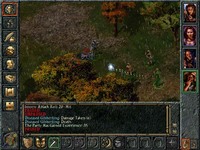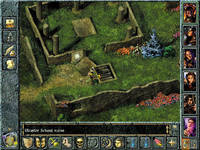|
|

|
BATTLE SYSTEM
|

|
INTERACTION
|

|
ORIGINALITY
|

|
STORY
|

|
MUSIC & SOUND
|

|
VISUALS
|

|
CHALLENGE
|
Variable
|
COMPLETION TIME
|
30+hrs
|
|
OVERALL
5.0/5
|
Rating definitions
|
|
|
Videogamers are often divided into two factions: those that play console games and those that play computer games. Ask a console gamer to name a traditional style RPG and you're likely to hear Final Fantasy, Dragon Quest, Shin Megami Tensei, or some equally obvious representative of the most popular games in the genre. Ask a PC gamer to name a traditional style RPG, however, and the answer you get will very likely be the venerable Baldur's Gate. Why does it spring so immediately and universally to mind for PC RPGamers? There's no single easy answer to that question, but there are a few possibilities.
Ever since Gary Gygax devised rules for a structured roleplaying game, they have been adapted to other purposes up to and including videogame design. In the case of Baldur's Gate, the 2nd Edition rules of Dungeons & Dragons - itself one of the progenitor PnP RPGs - were the proverbial engine upon which the game was designed; be it the six basic character stats, the THAC0 based battle system, or the go-anywhere-explore-everything nature of the game, all things D&D2E ended up in Baldur's Gate, its expansion, and its sequel. In this way, for old school gamers at least, the game maintained a very straightforward drag-and-drop/point-and-click equipment, experience, and skill system that has been used to various degrees in dozens of other games since.
Amazingly, in the near decade since it was released, the visuals in Baldur's Gate have not fallen as far behind as they might have. One possible reason for this is that the entire game is played from a semi-overhead point of view - much like the original Legend of Zelda - and is entirely 2D and sprite based. Whereas RPGs with early 3D modeling such as Final Fantasy VII have begun to look fairly poor for their age, Baldur's Gate and its numerous Infinity Engine brethren all manage to look at least passable after all this time. On a similar note, although the voice acting and music are equally old, because the former was recorded in English natively and because the latter is entirely symphonic, both aspects of the game retain a great deal of their excellent quality even by today's standards.
 Nope. Definitely Not Sugar.
Nope. Definitely Not Sugar.
|
|
Combat is peculiar in that although it sticks to the turn-based nature of its source material, the game plays out with a sense of real-time urgency. Often when you come under attack, your party members will simply retaliate with whichever weapon they happen to have equipped at the time; this can occasionally lead a character weak in melee skills to the frontlines where he or she will be swiftly killed, so it is always in your best interest to keep the screen squarely ahead of where your party is going so you have time to react to a bad situation. You can pause the game on the fly to issue new commands, change equipment or targets, and use healing items, and when you unpause, your heroes will adjust their offense and defense accordingly. By carefully positioning your party members, knowing the range of spells and weapons, keeping a variety of classes in your party, and having adequate healing supplies, you can skirt through most of the more difficult battles in the game nary losing a companion, although having back-up saves just before the end of each chapter never hurts regardless.
Divided into seven large chapters, the story of Baldur's Gate begins in the Sword Coast fortress of Candlekeep which you and your foster father, Gorion, are attempting to leave posthaste. Your first night on the road, a mysterious man in black armor, Sarevok, ambushes the two of you and kills Gorion before your very eyes after which you narrowly escape into the forest. The remainder of the game revolves around Sarevok and his sinister plot to destroy both you and the people of the Sword Coast, although his motives do not become apparent until very near the game's finalé. Along the way, you have the opportunity to meet some of the most influential names in the Forgotten Realms, be they Drizzt Do'Urden, Elminster, or any of a multitude of others.
The amount of effort you'll need to put forth in order to defeat Sarevok rests very heavily on which difficulty setting you choose, what types of characters you have in your party, and how many of the hundred-or-so sidequests you decide to undertake. If, for example, you decide to wantonly explore every inch of the Sword Coast on the highest difficulty setting, you're looking not just into the maw of death but at a sixty-hours-plus game clock. On the other hand, if you're confident that your heroes can squeak by with a bare minimum of skills and equipment but with a heaping dose of luck, you're more likely to come in around thirty hours.
 Magical Ruins... Sounds Dangerous.
Magical Ruins... Sounds Dangerous.
|
|
Perhaps the most interesting and important thing about Baldur's Gate is not that it's a great game, but that it came along at precisely the right time to revive a dying PC RPG market. The Infinity Engine, developed by Bioware, has since been used to develop at least three other games and was the template for the massively popular Neverwinter Nights and its exceptional Aurora Toolset, a set of software tools that have allowed literally thousands of would-be game designers to get their feet wet by making playable modules for their friends as well as their portfolios. In essence, although Baldur's Gate was not the only RPG made for PCs in the late 1990s, it was the RPG that sparked a gaming renaissance for computer users the world over.
It could feasibly be argued that Baldur's Gate is one of the most influential videogames ever created, and as if that weren't proof enough of its exemplary qualities, it just so happens to be well crafted, entertaining, and a whole lot of fun, too.
Review Archives
|









